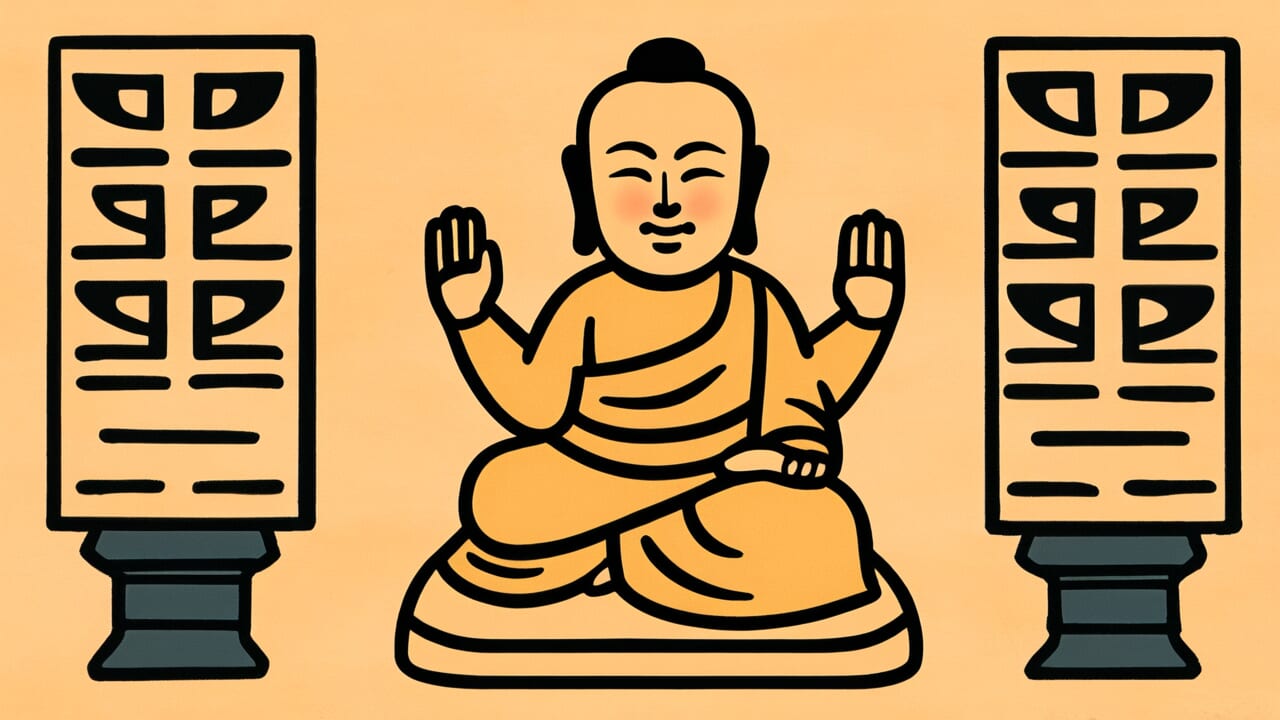How to Read “Buddha has no sect”
Shaka ni shūshi nashi
Meaning of “Buddha has no sect”
This proverb means that someone who has reached true enlightenment doesn’t care about sectarian differences.
Buddha, the founder of Buddhism, achieved enlightenment and reached ultimate truth. For someone at that level, the sectarian divisions and doctrinal differences created by later generations don’t matter at all.
People who reach deep understanding or high mastery don’t get caught up in formal frameworks or group affiliations. They see through to the essence of things.
This saying applies beyond religion. Truly excellent people with deep insight have a universal perspective that transcends factional or positional differences.
The proverb teaches us the importance of seeing the essence rather than obsessing over surface-level differences and conflicts.
Origin and Etymology
The exact origin of this proverb in historical texts hasn’t been identified. However, it likely emerged from fundamental Buddhist philosophy.
Buddha, the founder of Buddhism, taught people the truth after achieving enlightenment. But Buddha himself never created a specific sect.
Buddhism split into various sects in later eras. This happened because disciples and their successors developed their own interpretations and practice methods.
In Japan, many sects emerged from the Heian period onward. Tendai, Shingon, Pure Land, and Zen Buddhism each established unique doctrines and training methods. Conflicts and debates between sects were common.
Against this backdrop, this proverb likely arose as a way to reflect on Buddha’s original state of mind.
For Buddha, who reached true enlightenment, sectarian distinctions created by later generations held no meaning. This saying grew within Buddhist culture, teaching the importance of seeing essential truth rather than clinging to forms and labels.
Usage Examples
- That teacher embodies “Buddha has no sect,” teaching the essence equally to students from any school without discrimination
- True masters follow “Buddha has no sect”—they don’t care about differences between schools
Universal Wisdom
When humans form groups, we inevitably create distinctions between “us and them.” Even groups that start with the same purpose eventually develop different interpretations and methods.
Over time, factions and conflicts emerge. This happens not just in religion, but in scholarship, art, and every field. It’s a recurring pattern in human nature.
This proverb has been passed down because it offers deep insight into this human tendency.
We sometimes lose sight of our original purpose and essence while trying to protect our group’s identity. We obsess over differences in form, name, and organizational affiliation. These become seeds of conflict.
But what really mattered in the first place? The heart seeking truth, the wish to help people, the passion to create something better.
In these essential aspects, isn’t everyone actually facing the same direction?
This proverb points out human weakness—getting caught up in form and losing sight of essence. But it also teaches the importance of returning to essence.
It shows us hope that those who reach truly high levels can see beyond superficial differences.
When AI Hears This
Shannon, the founder of information theory, proved that no information can be compressed below its original complexity.
For example, if you compress data with 100 bits of information entropy to 50 bits, something must be lost. When we apply this to Buddha and sects, a surprising structure emerges.
Consider Buddha’s enlightenment as “an information source at maximum entropy state.” In other words, complete truth containing all possibilities.
Meanwhile, each sect’s doctrine corresponds to “a specific compression algorithm.” Pure Land Buddhism uses nembutsu chanting, Zen uses seated meditation. Each tries to compress and transmit truth through different methods.
What’s crucial here is that information loss is unavoidable regardless of which compression method you choose.
Just as JPEG compression loses fine details in images, expressing truth through doctrinal forms necessarily cuts away part of the original richness.
That’s why Buddha himself isn’t bound to any specific sect. The information content of truth exceeds the capacity of any doctrinal system.
When sects conflict with each other, it actually has the same structure as incompatibility between different compression formats.
Like MP3 and FLAC differ, both express the original music, but different methodologies make them incompatible. “Buddha has no sect” is a brilliant linguistic expression of truth being fundamentally incompressible.
Lessons for Today
Modern society continues advancing subdivision and specialization in every field. In scholarship, business, and even hobbies, countless schools and methodologies exist. Each claims its own correctness.
On social media, debates about who’s right unfold daily.
This proverb reminds us of something important. What are you really aiming for? Proving your group’s superiority? Or pursuing essential value?
Recognizing differences is important. But are you so obsessed with differences that you’ve lost sight of common purpose and essence?
Are you closing your ears and judging only by labels, even though you could learn from people with different positions?
This proverb teaches the importance of having a flexible perspective. Hold your position, but don’t cling to it too tightly.
Cultivate eyes that see essence beyond form and affiliation. Such an attitude may be the path to true growth.



Comments